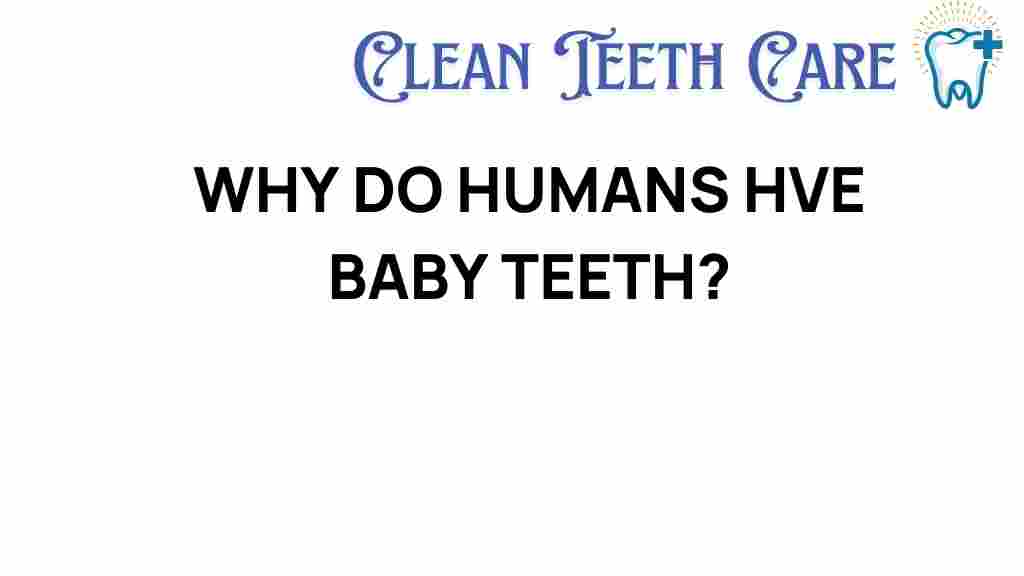Unraveling the Mystery: Why Do Humans Have Baby Teeth?
When we think about childhood, one of the most charming aspects is the presence of baby teeth. These tiny teeth, also known as primary teeth, play a crucial role in dental development. They not only aid in the early stages of eating and speaking but also pave the way for the adult teeth that will eventually replace them. Understanding the purpose and significance of baby teeth can enhance our knowledge of childhood health, oral hygiene, and the teething process. In this article, we will delve deep into the world of baby teeth, exploring their importance, the stages of dental development, and tips for maintaining oral hygiene during this critical time.
What Are Baby Teeth?
Baby teeth, or primary teeth, are the first set of teeth that develop in humans. Typically, children have 20 baby teeth, which begin to emerge around six months of age and are usually in place by the age of three. These teeth serve various essential functions, from helping children chew their food to enabling clear speech. Moreover, they maintain space in the jaw for the future adult teeth.
The Importance of Baby Teeth in Childhood Health
Baby teeth are more than just placeholders for adult teeth; they play a vital role in a child’s overall health:
- Nutrition: Proper chewing is essential for a balanced diet. Baby teeth enable toddlers to eat a variety of foods, aiding in nutritional development.
- Speech Development: Clear pronunciation is often reliant on the presence of baby teeth, which help in forming words correctly.
- Jaw Development: The presence of baby teeth maintains the necessary space for adult teeth, promoting healthy jaw growth.
- Self-Esteem: A healthy smile boosts confidence in children, contributing to positive social interactions.
The Teething Process: When Do Baby Teeth Erupt?
The teething process can be a challenging time for both parents and children. It typically begins around six months of age, but the timing can vary. Here’s a general timeline of when baby teeth usually erupt:
- Central Incisors: 6 to 12 months
- Lateral Incisors: 9 to 16 months
- Canines: 16 to 23 months
- First Molars: 13 to 19 months
- Second Molars: 25 to 33 months
During the teething process, children may experience discomfort and other symptoms, which can include:
- Increased drooling
- Irritability or fussiness
- Chewing on objects
- Swollen gums
To help alleviate discomfort, parents can offer teething rings or cold washcloths for children to chew on. Over-the-counter pain relief may also be used, but it’s essential to consult a pediatric dentist or physician for appropriate recommendations.
Pediatric Dentistry: Caring for Baby Teeth
Maintaining oral hygiene for baby teeth is crucial. Establishing good habits early can set the foundation for a lifetime of healthy teeth. Here are some important tips for parents:
1. Start Early with Oral Hygiene
Even before the first tooth erupts, parents should clean their child’s gums with a damp cloth after feedings. Once the first teeth appear, switch to a soft-bristled toothbrush and a small amount of fluoride toothpaste.
2. Regular Dental Check-ups
Children should visit a pediatric dentist by their first birthday or within six months of their first tooth eruption. Regular check-ups will help monitor dental development and catch any potential issues early.
3. Healthy Eating Habits
A balanced diet is essential for healthy baby teeth. Limit sugary snacks and drinks, as they can lead to cavities. Encourage healthy foods, such as fruits, vegetables, and whole grains.
4. Fluoride Use
Fluoride strengthens teeth and helps prevent cavities. Discuss with your child’s dentist about the appropriate fluoride treatments and toothpaste for your child’s age.
Common Issues with Baby Teeth
As children grow, they may face several common issues related to their baby teeth:
1. Tooth Decay
Cavities can occur even in baby teeth. It’s important to maintain good oral hygiene to prevent decay, as untreated cavities can lead to infections and pain.
2. Early Tooth Loss
Sometimes, baby teeth may fall out prematurely due to decay or trauma. Early tooth loss can affect the alignment of adult teeth, potentially leading to orthodontic issues later.
3. Misalignment
Sometimes baby teeth may not come in properly, leading to misalignment. Regular visits to a pediatric dentist can help identify and address these issues early.
Tooth Loss: Transitioning from Baby Teeth to Adult Teeth
Typically, children begin to lose their baby teeth around six years of age. This process is a natural part of dental development and occurs in a specific order:
- Lower central incisors
- Upper central incisors
- Upper lateral incisors
- Lower lateral incisors
- First molars
- Canines
- Second molars
Parents should reassure their children that losing baby teeth is a normal part of growing up. It’s common for children to feel anxious or excited about this transition. A tooth fairy tradition may also help make the experience more enjoyable!
Conclusion: The Lasting Impact of Baby Teeth
Understanding the role of baby teeth in dental development is crucial for fostering childhood health. From the teething process to the importance of oral hygiene and regular dental check-ups, parents play a vital role in ensuring their children have a healthy start to their dental journey.
Baby teeth are not just temporary; they greatly influence adult teeth and overall oral health. By prioritizing good dental habits early on, we can set our children up for a lifetime of healthy smiles.
For more information on pediatric dentistry and maintaining your child’s oral health, visit this resource. If you have specific questions or concerns about your child’s dental development, consult a pediatric dentist for personalized advice.
This article is in the category Conditions and created by CleanTeethCare Team
